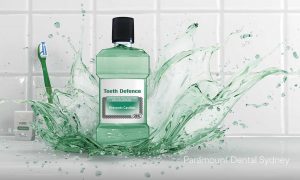Mouthwash
 There is no one-rinse-fits-all mouthwash. Depending on what a person is looking for, there is a mouthwash to fit their requirement. Each type of mouthwash targets a different dental concern. It may have both positive effects and few potential drawbacks.
There is no one-rinse-fits-all mouthwash. Depending on what a person is looking for, there is a mouthwash to fit their requirement. Each type of mouthwash targets a different dental concern. It may have both positive effects and few potential drawbacks.
Mouthwash can be categorised into
- Maintenance mouthwash
- Therapeutic mouthwash
- Fluoride mouthwash
- Mouthwashes for gum health
- Post surgical mouthwash
Maintenance mouthwash
This is for prevention of plaque accumulation and to control bad breath
Fluoride mouthwash
This makes the teeth stronger and resistant to decay. When the patient is prone to more tooth decay, fluoride mouthwash may be of great help. Also persons having orthodontic appliances or prosthesis and after chemotherapy or radiotherapy treatment, Fluoride mouthwashes are very effective.
Mouthwash for gum healing
They are generally used for a short period of time. This mainly consists of chlorhexidine which can cause tooth stains when used for a prolonged period say 3 weeks or more.
Post surgical mouthwashes
These are antiseptic mouthwashes which are used till the healing period which supports better healing.
Points to note while choosing a mouthwash
- Many commercial mouthwashes contain alcohol which can cause a dry mouth.
- When choosing a fluoride mouthwash better to stick with sodium fluoride.
- APF [Acidulated phosphate fluoride] containing mouthwashes are not recommended for patients having Ceramic brackets and Crowns.
- After using mouthwash, water rinse should be avoided.
- While using mouthwash vigorous gargling should be avoided as it will only lather and prevents the effectiveness of the mouthwash on the gums and teeth.
- Children should use mouthwash under adult supervision, as swallowing may be toxic.
- Elderly patients should not use mouthwash with alcohol composition as it may cause dryness of mouth.


 4.9 ⭐⭐⭐⭐⭐
4.9 ⭐⭐⭐⭐⭐ 